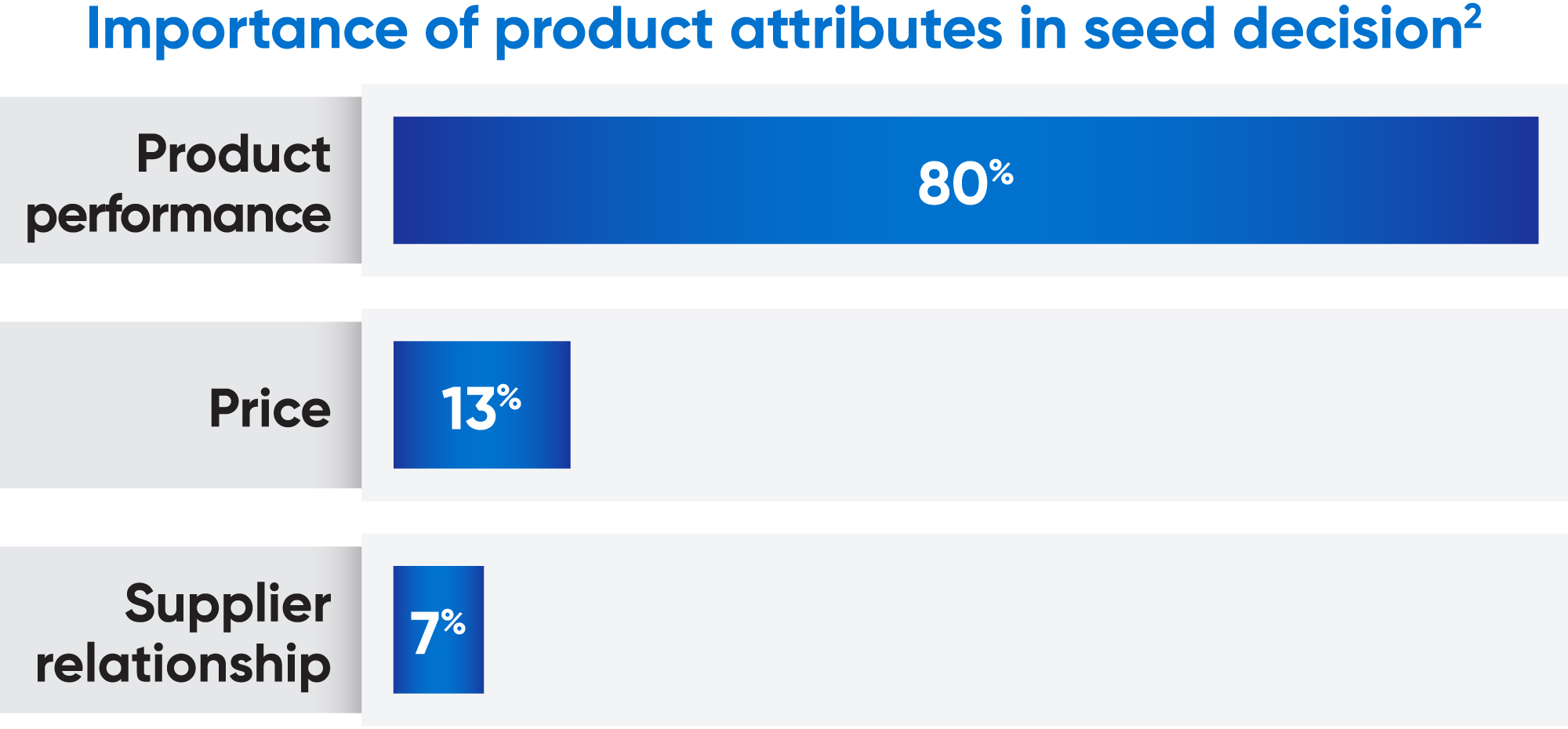Investing in Genetics

The seed business has always been about genetics. Why is that? Sure, insect protection and herbicide tolerant traits have their role. And good relationships count, too. But if you ask farmers what they really want, it’s genetics. Genetics drive performance. Traits protect the genetics. So, if genetics are so important and desired by farmers, seed companies should go after the absolute best genetics, right? This article explores the relationship between genetics, performance and customer satisfaction.
Genetic refinement throughout the years has helped improve the performance of modern corn hybrids. And increases in yield and crop performance largely stem from genetic gains.1 Era testing of corn hybrids is done to compare how far modern varieties have progressed. For example, improvements to genetics and management practices have given corn hybrids an average 1.8 bu/A bump every year since 1930.1 Newer hybrids also contain additional performance enhancements, including insect protection traits, along with disease and herbicide tolerances. These additions can further boost yield and performance potential.
Research from Purdue University examined what’s most important to large-scale farmers when making a seed decision. Product performance ranked first (80%). Price came in second place (13%) and supplier relationships ranked third (7%).

There are probably no surprises here for experienced seed professionals. But some may wonder whether the economics actually work out better for the farmer to buy corn products with good/average genetics that cost less. This has been researched extensively over the years, and one study run by the University of Nebraska-Lincoln showed that, on 1,000 acres, making an okay or good/average seed choice could drop profit by only $3,750. However, making a poor seed choice could mean a significant reduction in profit – $173,580. These results highlight the importance of not only avoiding bad genetics but also avoiding bad placement of seed products.3
Customer satisfaction is important for any business, because happy customers tend to return and spend more.4 In the example above, how satisfied would a farmer be if your brand’s performance resulted in $3,750 less profit than a competitive brand? What about $173,580 less? When seed genetics result in excellent performance, farmers tend to demonstrate their customer satisfaction and return to those genetics or seed brand according to Purdue’s farmer purchasing behavior data. They found that when farmers like their crop’s performance, more than 60% say they will be loyal to it and 56.2% will recommend it.2 So what happens when a seed company has a bunch of satisfied customers? They tend to hang onto them. They tend to buy more. Word spreads. The brand grows. What happens when you have a bunch of unsatisfied customers? We won’t go there. It’s too painful.
Elite genetics breed superior crop performance in terms of yield potential and the ability to manage stressors. The work to develop top genetic hybrids is supported by ongoing investment into new hybrids and new technologies. Corteva reinvests ~8% of its sales into research and development – the equivalent of roughly $4 million per day – to anticipate and solve farmers’ most intractable challenges. The result is one of the world’s largest germplasm libraries fueling a diverse and advanced breeding engine for Corteva’s seed brands and licensee customers.
1 Steve Butzen and Stephen Smith, “Corn Yield Gains Due to Genetic and Management Improvements,” (ND) accessed March 21, 2025, https://www.pioneer.com/us/agronomy/corn-yield-gains.html.
2 Luciano Thomé E Castro, “Farmers’ Purchasing Behavior and Implications for Suppliers’ Go-toMarket Strategies,” Purdue Center for Food and Agricultural Business, January 11, 2023, https:// agribusiness.purdue.edu/2023/01/11/farmers-purchasing-behavior-and-implications-for-suppliers/.
3 Matt Stockton, “Maximizing Profitability by Choosing the Right Corn Hybrid,” UNL Center for Agricultural Profitability, October 18, 2024, https://cap.unl.edu/news/maximize-profitabilitychoosing-right-corn-hybrid/.
4 Expert Panel, “17 Key Metrics to Ensure Genuine Client Satisfaction,” Forbes, August 25, 2023, https://www.forbes.com/councils/forbesbusinesscouncil/2023/08/25/17-key-metrics-to-ensuregenuine-client-satisfaction/.
™ ® Trademarks of Corteva Agriscience and its affiliated companies. © 2025 Corteva. 025754 LC (04/25)